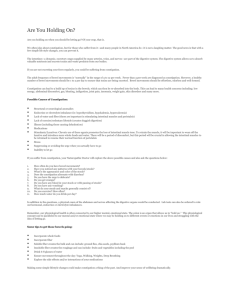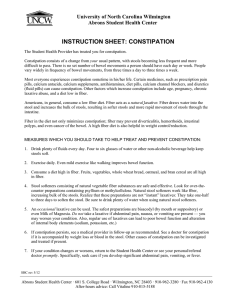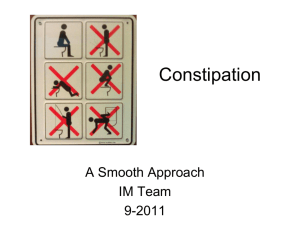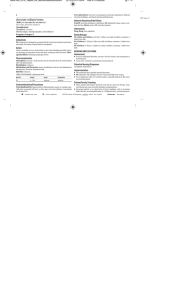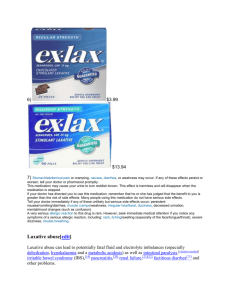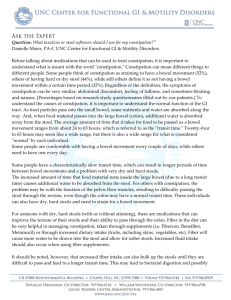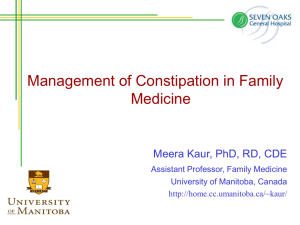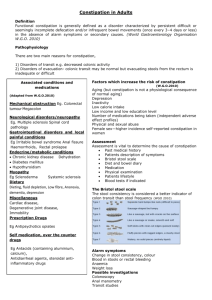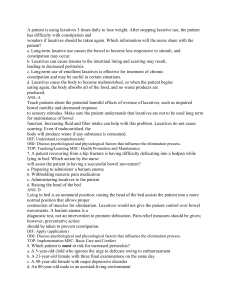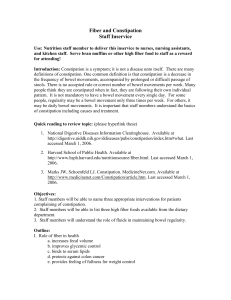Naturopathic Treatment for Constipation
advertisement
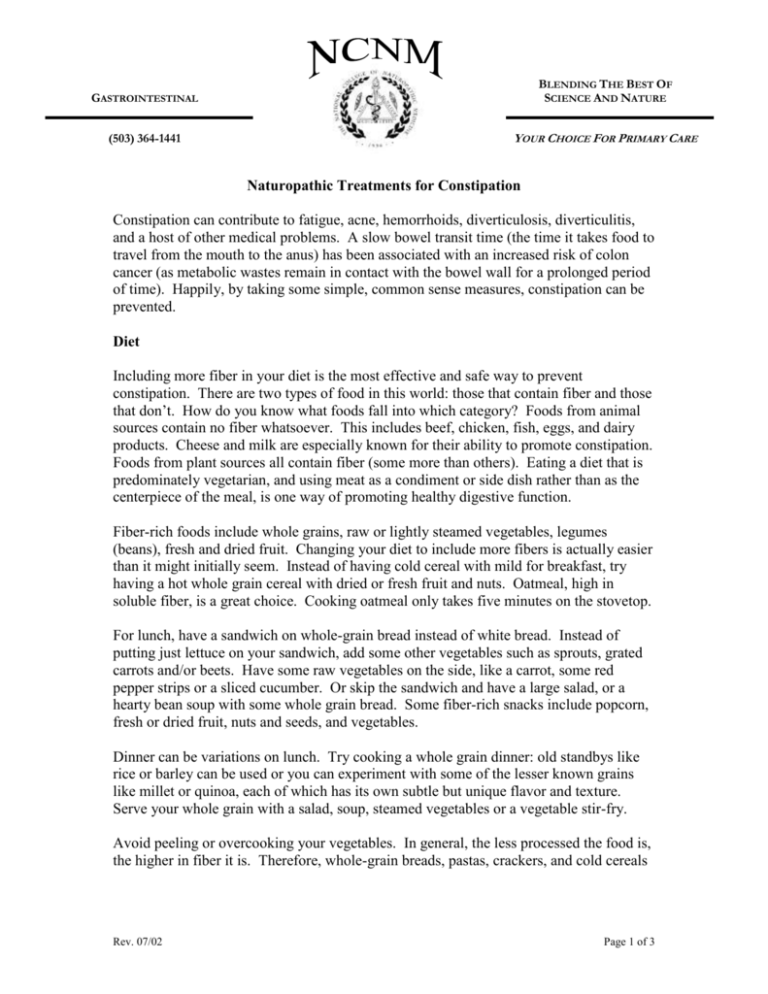
GASTROINTESTINAL BLENDING THE BEST OF SCIENCE AND NATURE (503) 364-1441 YOUR CHOICE FOR PRIMARY CARE Naturopathic Treatments for Constipation Constipation can contribute to fatigue, acne, hemorrhoids, diverticulosis, diverticulitis, and a host of other medical problems. A slow bowel transit time (the time it takes food to travel from the mouth to the anus) has been associated with an increased risk of colon cancer (as metabolic wastes remain in contact with the bowel wall for a prolonged period of time). Happily, by taking some simple, common sense measures, constipation can be prevented. Diet Including more fiber in your diet is the most effective and safe way to prevent constipation. There are two types of food in this world: those that contain fiber and those that don’t. How do you know what foods fall into which category? Foods from animal sources contain no fiber whatsoever. This includes beef, chicken, fish, eggs, and dairy products. Cheese and milk are especially known for their ability to promote constipation. Foods from plant sources all contain fiber (some more than others). Eating a diet that is predominately vegetarian, and using meat as a condiment or side dish rather than as the centerpiece of the meal, is one way of promoting healthy digestive function. Fiber-rich foods include whole grains, raw or lightly steamed vegetables, legumes (beans), fresh and dried fruit. Changing your diet to include more fibers is actually easier than it might initially seem. Instead of having cold cereal with mild for breakfast, try having a hot whole grain cereal with dried or fresh fruit and nuts. Oatmeal, high in soluble fiber, is a great choice. Cooking oatmeal only takes five minutes on the stovetop. For lunch, have a sandwich on whole-grain bread instead of white bread. Instead of putting just lettuce on your sandwich, add some other vegetables such as sprouts, grated carrots and/or beets. Have some raw vegetables on the side, like a carrot, some red pepper strips or a sliced cucumber. Or skip the sandwich and have a large salad, or a hearty bean soup with some whole grain bread. Some fiber-rich snacks include popcorn, fresh or dried fruit, nuts and seeds, and vegetables. Dinner can be variations on lunch. Try cooking a whole grain dinner: old standbys like rice or barley can be used or you can experiment with some of the lesser known grains like millet or quinoa, each of which has its own subtle but unique flavor and texture. Serve your whole grain with a salad, soup, steamed vegetables or a vegetable stir-fry. Avoid peeling or overcooking your vegetables. In general, the less processed the food is, the higher in fiber it is. Therefore, whole-grain breads, pastas, crackers, and cold cereals Rev. 07/02 Page 1 of 3 are preferably to white-flour basted products. A whole cooked grain is even better, as it has not been processed into flour at all. Flour-based foods are notoriously constipating (breads, pastas, etc). You may choose to start increasing your fiber intake in small steps. Make a commitment to eating one salad every day, or decide to eat two pieces of fresh fruit a day. Ripe pears are especially known for their laxative effect. Increase Your Fluid Intake A dry stool is a difficult-to-pass stool. Water enhances the elimination of metabolic wastes and helps to soften and lubricate stools, making them easier to pass. Make sure you drink eight 8-ounce glasses of water each day. A good way to help you remember to do this is to fill a jug in the morning with 64 ounces of water and carry it with you throughout the day, drinking from it until it’s empty. Milk, soda pop, alcoholic beverages, coffee, and black tea do not count as glasses of water. Milk is a food, not a drink. Soda pop is best avoided due to its high sugar content. Alcohol, coffee, and black tea are all diuretics, they can actually draw fluid out of the body rather than replenishing it with the end result of dehydrating you. Water and herb teas are the best sources of fluid. Sparkling water with a small amount of fruit juice to sweeten it is a good substitute for soda. Drinking two large mugs of hot herbal tea first thing in the morning, before breakfast, is an excellent way to stimulate peristalsis (the muscular motion of the digestive tract that propels its contents toward the anus). Or try drinking two 8-ounce glasses of cold or hot water with fresh-squeezed lemon juice before breakfast. The astringent effect of the citrus stimulates and tonifies the bowels. Exercise Any amount of exercise will increase the body’s metabolic rate and promote peristalsis. Even a fifteen-minute walk a day can make a significant difference. Re-train Your Bowel Some people fail to have regular bowel movements because, consciously or not, they suppress the urge. This is often seen in those with busy schedules who think to themselves, “I just can’t spare the time to go to the toilet right now.” When the urge to defecate is suppressed, the nerves of the large bowel accommodate to the sensation of stool in the rectum, and the normal urge to have a bowel movement disappears. You can re-train your bowels by sitting on the toilet and relaxing for fifteen minutes at the same time every day. In the morning, after breakfast, can be a good time to do this. Sit down whether you think you have to go or not. You may be surprised to find that you actually do have stool to pass more often than you would have thought. Rev. 07/02 Naturopathic Treatment for Constipation, Page 2 of 3 Abdominal Massage Massaging your abdomen (belly) is one way to promote peristalsis and elimination. While lying down, start at the lower right part of your belly, move to the upper right, then over to the upper left, and finally down to the lower left part of your belly. This clockwise direction assists the natural flow of peristalsis in the colon. Laxatives There are many different types of herbal laxatives. Some can be habit forming, those one are best avoided. Laxatives should be used as a last resort or as a temporary addition to the dietary changes you are already making. The best type of laxative is a bulk laxative, these include flaxseeds, and psyllium seeds, which may be eaten as whole seeds or taken as powders or capsules. Irritant laxatives, including aloe, senna, cascara, and others, should be used under a doctor’s supervision and for a short time period only. References: Spiller, Gene. CRC Handbook of Dietary Fiber in Human Nutrition, 3rd Edition (Boca Raton, FL: CRC Press, 2001) Murray, Michae and Pizzorno, Joseph, Encyclopedia of Natural Medicine (Rockin: Prima Publishing, 1998): 126-144 Rev. 07/02 Naturopathic Treatment for Constipation, Page 3 of 3
